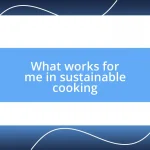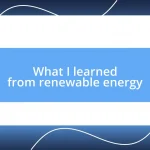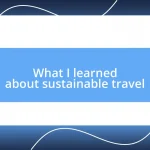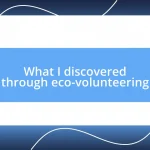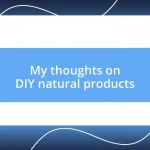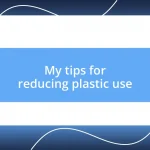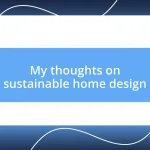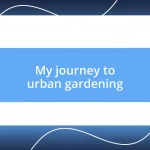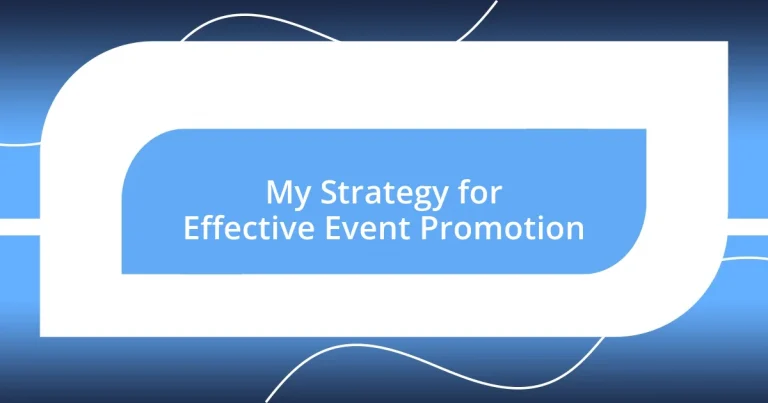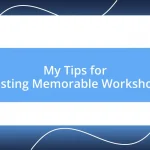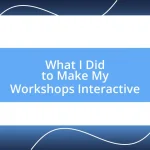Key takeaways:
- Understanding your target audience enhances engagement and increases attendance by addressing their interests and preferences.
- Setting clear, measurable objectives guides the promotional process, allowing for better progress tracking and meaningful outcomes.
- Utilizing social media and engaging with influencers expands reach and fosters authentic connections, making event promotion more effective.
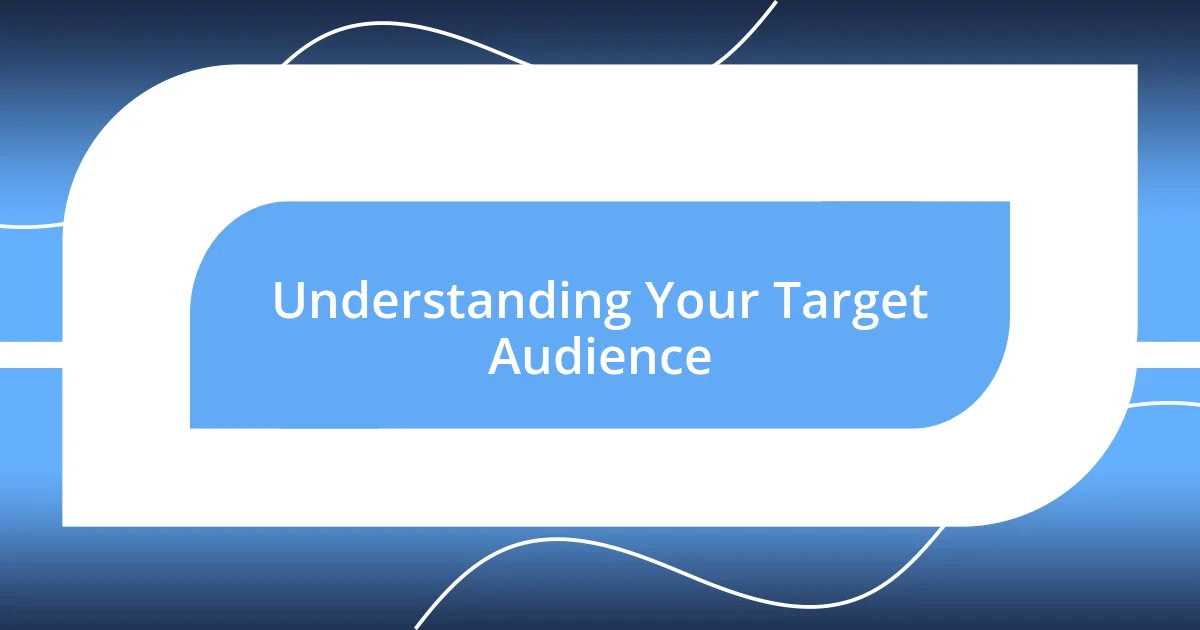
Understanding Your Target Audience
Understanding your target audience is like uncovering a hidden treasure map. I remember when I first started promoting my events, I thought I could just cast a wide net. However, I soon realized that truly getting to know my audience made all the difference. I started by asking myself: Who are they? What are their interests and pain points? This exploration has continually guided my promotional strategies.
One time, I hosted a workshop aimed at young entrepreneurs, but I failed to consider their busy schedules. Interestingly, I gathered feedback, and it turned out that evening sessions were far more appealing to them. That experience taught me an invaluable lesson: when you listen to your audience, you create a space where they feel valued. Knowing their preferences not only boosts engagement but also increases attendance.
Imagine planning an event that aligns perfectly with the desires of your target audience. How rewarding would that be? I find that drawing a customer persona—detailing demographics, lifestyle, and motivations—helps crystallize my promotional efforts. It’s not just about filling seats; it’s about connecting with those who genuinely benefit from what I offer. Understanding your audience sets the foundation for meaningful and effective event promotion.
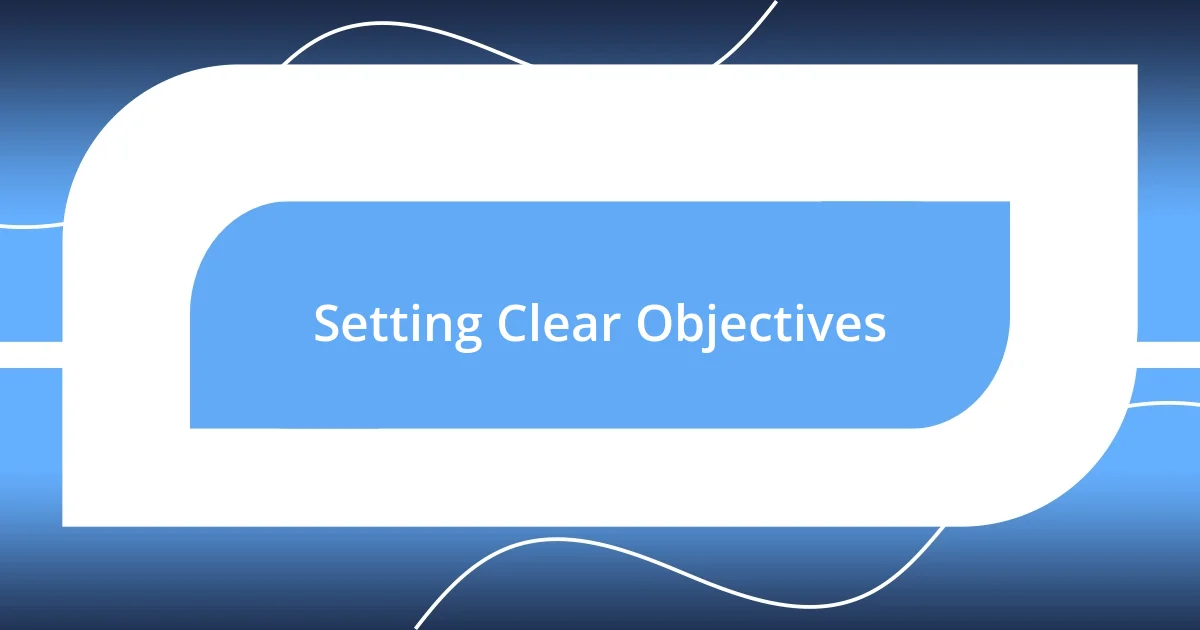
Setting Clear Objectives
Setting Clear Objectives
Establishing clear objectives for your event is like setting a GPS before a road trip; it ensures you know where you want to go. In my early days of event promotion, I often dove in without a solid goal, simply hoping for the best. But when I began defining specific, measurable objectives—like achieving a certain number of ticket sales or engaging with participants on social media—the process became much more focused and rewarding.
I remember organizing a charity fundraiser where my objective was not only to raise funds but also to increase community involvement. By clarifying that intention, I was able to design activities that encouraged collaboration among attendees, turning a simple event into a vibrant community gathering. When everyone understands the objective, the atmosphere shifts—from a one-sided transaction to a shared experience filled with energy and purpose.
To put it simply, effective event promotion hinges on clear objectives. When you know what success looks like, it’s easier to measure your progress and make adjustments along the way. I suggest writing down your goals and revisiting them regularly, allowing the objectives to evolve as your vision grows. Engaging with your goals makes the planning process not just a task but an exciting journey of discovery.
| Characteristic | Importance |
|---|---|
| Specificity | Helps in creating targeted marketing efforts. |
| Measurable | Allows you to track progress and success. |
| Achievable | Ensures that your goals are realistic and attainable. |
| Relevant | Aligns with overall vision for meaningful outcomes. |
| Time-bound | Creates urgency and helps in timely execution. |
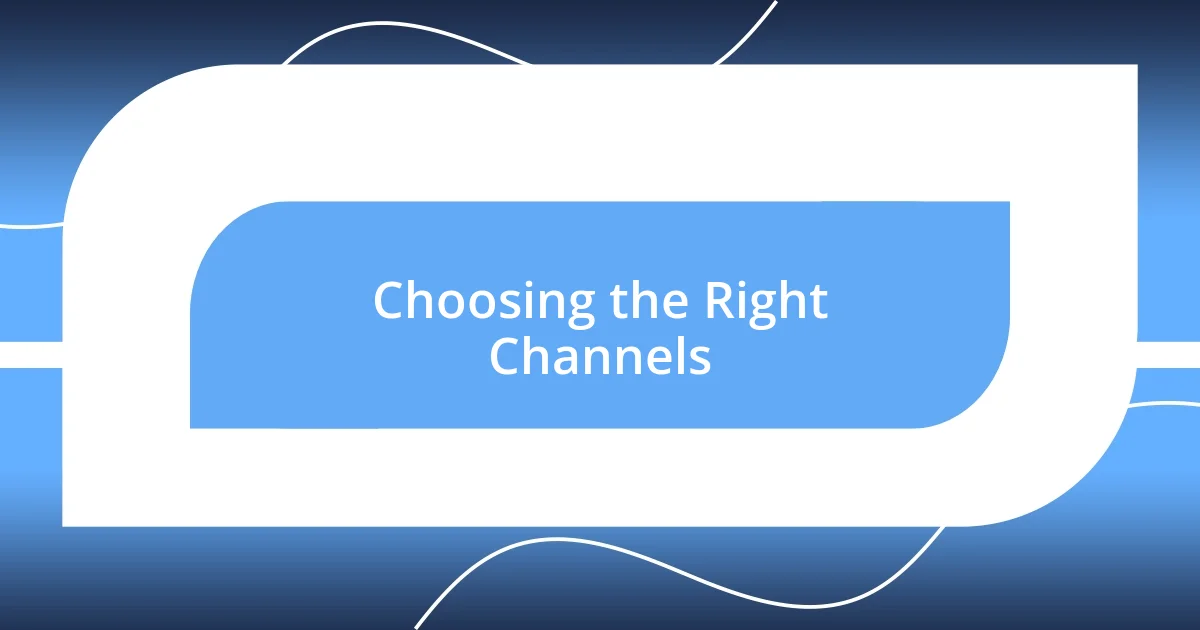
Choosing the Right Channels
Choosing the Right Channels
Selecting the right channels for event promotion can feel daunting, but it’s crucial for reaching your intended audience effectively. When launching a recent tech seminar, I found myself overwhelmed by the options—social media, email newsletters, paid ads, and even community boards. After some trial and error, I discovered that a combination of targeted social media ads and local community outreach yielded the best results. There’s something about engaging directly with people in your community that adds a personal touch to your promotion efforts.
Here are some channels I recommend considering based on your audience:
- Social Media: Utilize platforms like Facebook, Instagram, and LinkedIn to create event pages and ads.
- Email Marketing: Send newsletters to your inbox subscribers with details and reminders about your event.
- Local Partnerships: Collaborate with local businesses or organizations to co-promote your event.
- Influencer Marketing: Engage local influencers who align with your event’s theme to reach a wider audience.
- Community Boards: Post on local bulletin boards or online community groups relevant to your event’s theme.
I remember a time when I tapped into a local entrepreneur’s network to promote a workshop. By cross-promoting through their channels, I not only enhanced visibility but also built a sense of community. This experience reinforced my belief in the power of collaboration, and I’ve embraced it as a vital part of my promotional strategy ever since.
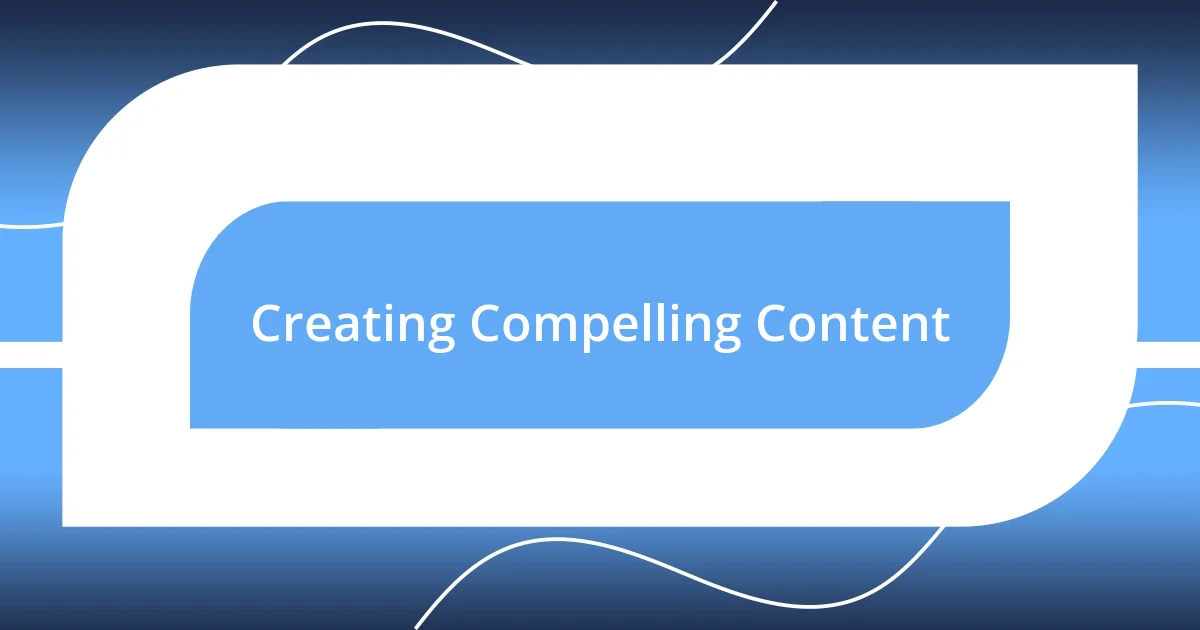
Creating Compelling Content
Creating compelling content is all about connecting on a personal level with your audience. I remember crafting an invitation for a small art exhibition, pouring my passion into every word. Instead of just listing the details, I shared the inspiration behind the event, which drew people in more effectively than any generic promotion could. When you tell a story, you create an emotional connection that resonates—and that’s the kind of engagement every event needs.
Have you ever thought about how visuals can transform your content? I once utilized vibrant images and artwork from the featured artists to promote an art class I was hosting. The difference was immediately noticeable; people were captivated, eager to learn, and signed up in droves. Images can spark interest and convey emotions that words alone may struggle to express. It’s not just about saying what you’re offering; it’s about inviting people to experience it through captivating visuals.
Lastly, consider the impact of user-generated content. During an outdoor festival I managed, I encouraged attendees to share their moments on social media with a unique hashtag. The result was a flood of authentic posts that not only highlighted the event but also made everyone feel part of something larger. There’s power in allowing your audience to be co-creators of your content. How exciting is it to witness the enthusiasm and creativity of your attendees play out publicly? In my experience, this strategy not only boosts engagement but also fosters community, making your event unforgettable.
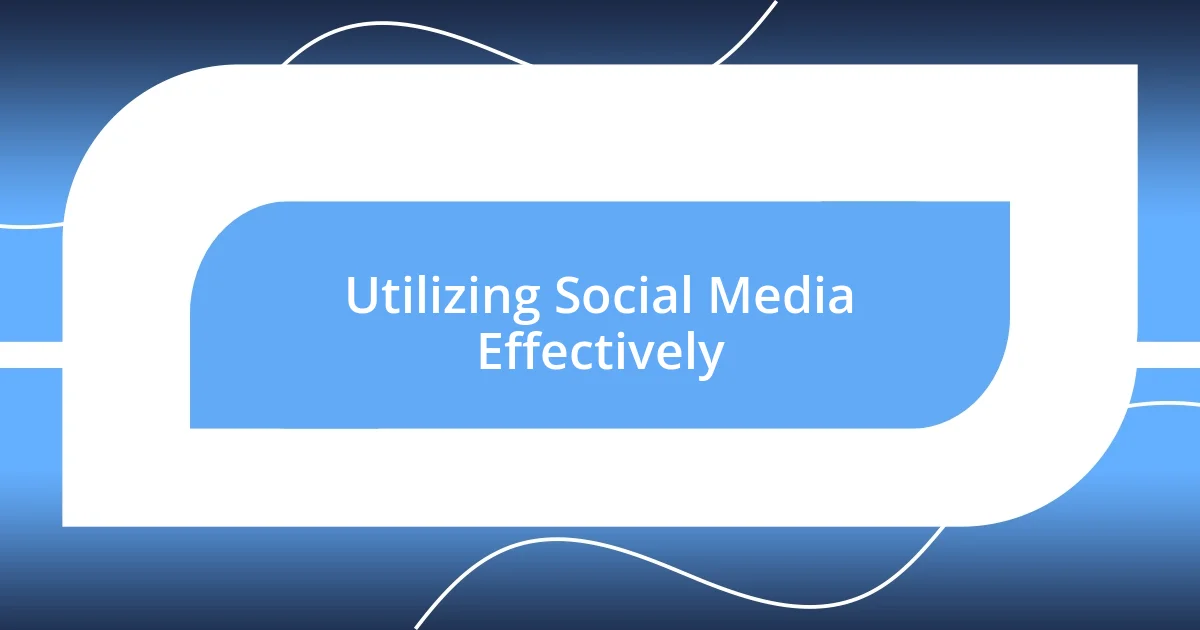
Utilizing Social Media Effectively
Utilizing social media effectively can be a game-changer for event promotion. I remember promoting a music festival through Instagram Stories, using countdowns and behind-the-scenes glimpses to build hype. The excitement was palpable as followers engaged and shared their anticipation, making it feel like everyone was part of the unfolding narrative. Have you ever felt that rush of community when everyone is eagerly counting down to an event together? It’s an energy that can’t be replicated.
Engagement goes beyond mere posting—it’s about interacting with your audience. During my latest workshop, I hosted Q&A sessions on Facebook Live, where potential attendees could ask questions in real-time. The responsive atmosphere drew in curious participants, transforming a simple promotion into an engaging conversation. Isn’t it fascinating how direct interaction can shift a promotional post from a monologue to a dialogue, fostering a deeper connection with your audience?
Lastly, I’ve found that leveraging social media analytics can guide your promotional strategy. I once analyzed engagement metrics from a previous event, identifying the best times to post and the types of content that resonated most. It wasn’t just about likes; it was about understanding what genuinely connected with my audience. So, have you taken the time to dig into your social media insights? Each insight can be a treasure map, leading you to more effective promotional strategies tailored to your audience’s needs.
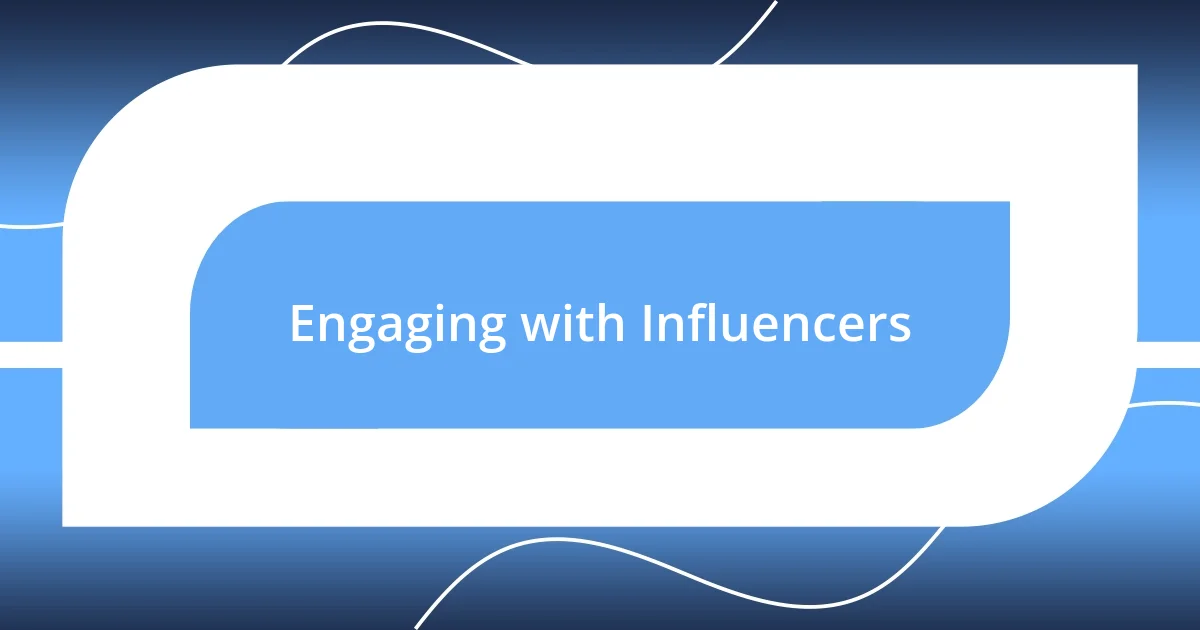
Engaging with Influencers
Engaging with influencers can be a pivotal tactic when promoting an event. I remember collaborating with a local food blogger for a culinary festival. After they shared their personal enthusiasm about the event on their platform, it was incredible to see how their followers showed up in droves. Their genuine passion resonated with their audience, could you feel that connection if you were in their shoes?
It’s not just about having influencers share your event; building a relationship is key. Once, I invited a few influencers to a VIP preview of an art show. We engaged them in a discussion about their favorite pieces, creating a shared experience that they later shared with their followers. This authentic interaction made their posts feel personal and relatable, driving more interest than a standard promotional message ever could. Have you considered how these small touches can amplify your message?
Moreover, utilizing varied platforms allows influencers to reach different audiences. For instance, during a community event I organized, a popular TikToker created short, engaging videos showcasing the behind-the-scenes preparations. This unique approach caught the eye of younger attendees, whose demographic may not have been reachable through traditional channels. Isn’t it empowering to see the diverse ways influencers can bring new energy to your event? By tapping into their creativity, you not only broaden your reach but also infuse your promotion with fresh authenticity.
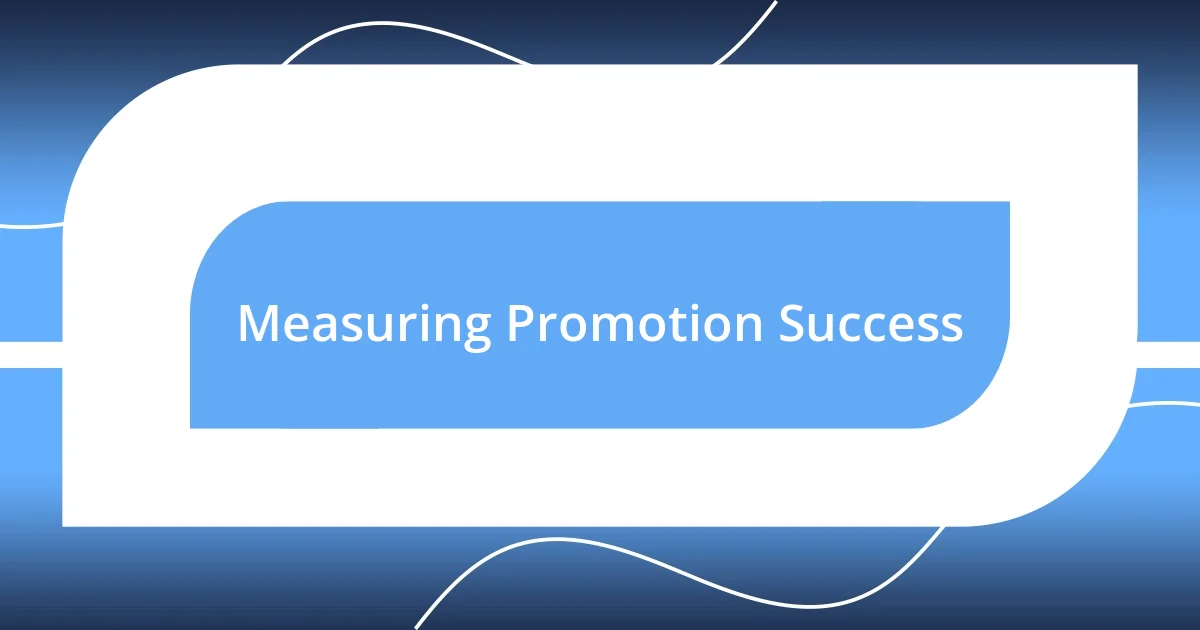
Measuring Promotion Success
Measuring promotion success isn’t just about numbers; it’s about understanding how those numbers reflect engagement and interest. I recall organizing a charity gala where we set tangible goals—ticket sales, social media shares, and overall reach. After the event, examining these metrics was eye-opening. Did we connect with our audience effectively? Those numbers told a story, revealing what resonated and what fell flat.
I’ve also found that qualitative feedback can be just as valuable as hard data. When I conducted a post-event survey for a community workshop, I sincerely wanted to know what attendees felt. Their heartfelt responses highlighted aspects of the experience I hadn’t even considered. Have you ever noticed how open-ended questions can lead to surprising insights? The difference between “What did you like most?” and “How did this event impact you?” can reveal a depth of connection that sales alone cannot illustrate.
Lastly, I recommend using tools like Google Analytics to deepen your understanding of online engagement. I remember a particularly rewarding experience when I started tracking website traffic leading up to an event. The revelation of which promotional channel brought in the most visitors helped me refine my strategy for the next occasion. Isn’t it intriguing how a little sleuthing in the data can vastly improve future efforts? By harnessing these insights, I could be more strategic and intentional in my promotional approaches, ensuring a better connection with my audience.

